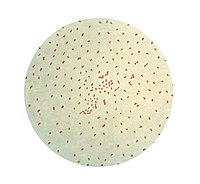
Photo from wikipedia
ABSTRACT Introduction: Klebsiella pneumoniae (KP) are a leading cause of healthcare-associated infections. The dramatic increase in microbial resistance to third-generation cephalosporin and carbapenem ‘front line’ antimicrobial agents and the paucity… Click to show full abstract
ABSTRACT Introduction: Klebsiella pneumoniae (KP) are a leading cause of healthcare-associated infections. The dramatic increase in microbial resistance to third-generation cephalosporin and carbapenem ‘front line’ antimicrobial agents and the paucity of new antimicrobials have left clinicians with few therapeutic options and resulted in increased morbidity and mortality. Vaccines may reduce the incidence of infections thereby reducing the necessity for antimicrobials and are not subject to antimicrobial resistance mechanisms. Areas covered: We review whole cell, subunit, capsular polysaccharide (CPS), O polysaccharide (OPS) and conjugate vaccines against KP infection, as well as alternative KP vaccine platforms. Expert opinion: Vaccine-induced antibodies to KP CPS have been protective in preclinical studies, but the number of CPS types (>77) makes vaccines against this virulence factor less feasible. Since four OPS serotypes account of ~80% of invasive KP infections and anti-OPS antibodies are also protective in preclinical studies, both OPS-based conjugate and multiple antigen presenting system (MAPS) vaccines are in active development. Vaccines based on other KP virulence factors, such as outer membrane proteins, type 3 fimbriae (MrkA) and siderophores are at earlier stages of development. Novel strategies for the clinical testing of KP vaccines need to be developed.
Journal Title: Expert Review of Vaccines
Year Published: 2019
Link to full text (if available)
Share on Social Media: Sign Up to like & get
recommendations!